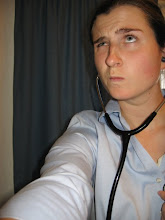Yesterday I was privileged to go to a church services in the village in which they celebrated Good Friday by reenacting the Passion (the story of the how Jesus was betrayed, arrested, sentenced, abused and crucified). It was a very touching performance that was both very meditative and beautiful. It lasted for about 2 hours with the performance (in Chichewa, the local language) interrupted periodically with singing from the choir. There were some interesting cultural references and interpretations. One of them was when Jesus was arrested in the garden, the soldiers weren’t carrying spears or swords (perhaps weapons that Americans might view as more historically accurate for the time period), but the soldiers were carrying wooden cutouts of Ak-47 guns. I thought that this was hilarious and also an interesting cultural interpretation of what “a solider” described in the Bible is to them.
Another, perhaps more distressing, cultural difference in the portrayal of the Passion that I witnessed last night, was in the treatment of the actor playing Jesus. The other actors literally beat him up. While in the United States if there was play in which one actor is supposed to hit another, there might be some encouragement/understanding among the director and performers that you will just PRETEND to hit the actor. Not so in this performance. They had branches and were hitting the Jesus actor full-force. They also pushed him to the ground a number of times. I asked the priest about this later. He said that there is informed consent for the actor who plays Jesus – he knows ahead of time that he will be beaten up. In fact, the same actor has played Jesus a number of years in a row, so he knows what he is in for. Sigh. The cost of fame.
 The crucifixion. Yes, they actually did tie the Jesus actor to the cross.
The crucifixion. Yes, they actually did tie the Jesus actor to the cross. Judas betraying Jesus to the priests guarded by the AK-17 wielding soldier.
Judas betraying Jesus to the priests guarded by the AK-17 wielding soldier.




